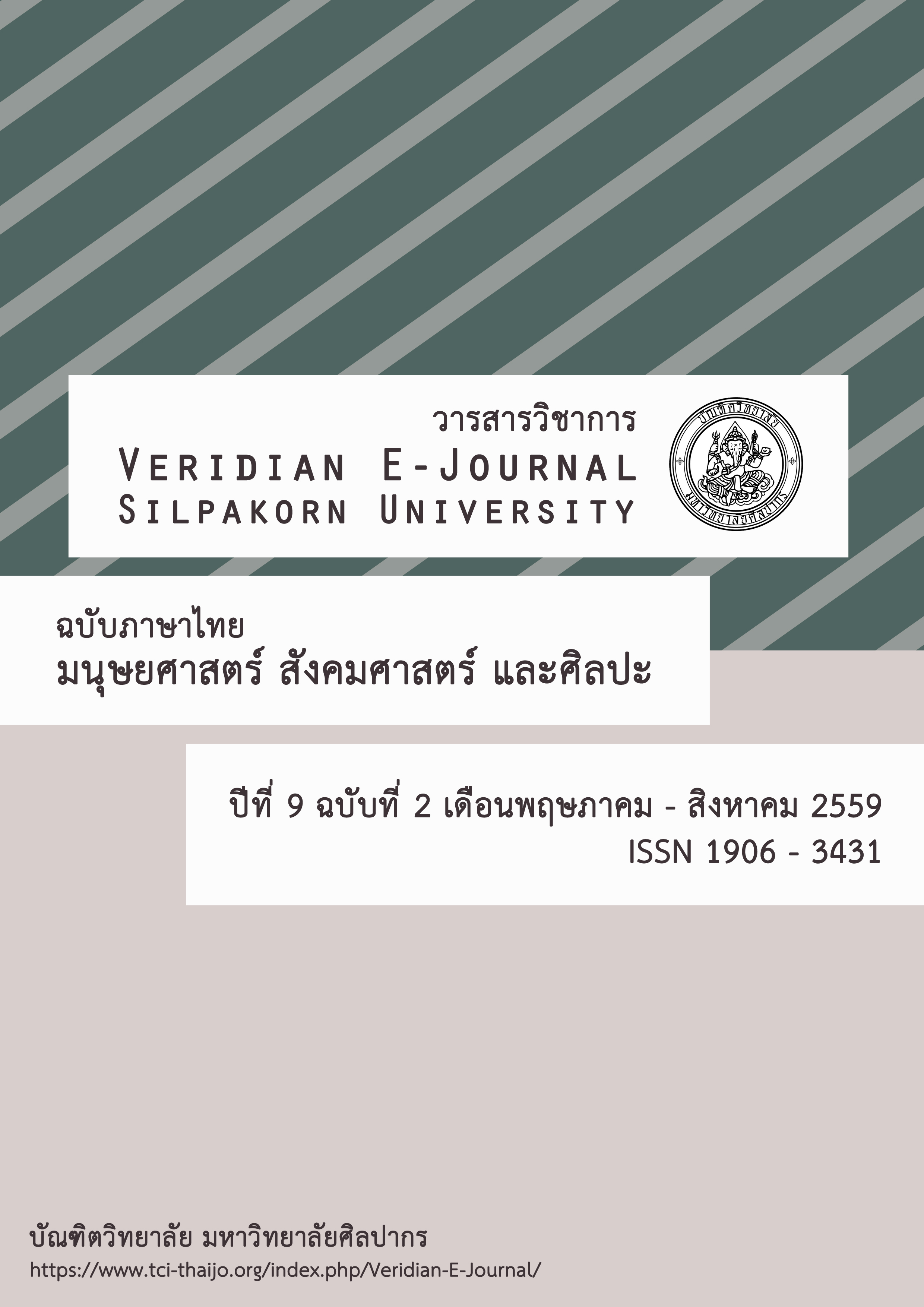ความพร้อมของการจัดการศึกษาในหลักสูตรเพื่อเข้าสู่ประชาคมอาเซียน ของมหาวิทยาลัยราชภัฏเพชรบุรี
Main Article Content
Abstract
การวิจัยความพร้อมของการจัดการศึกษาในหลักสูตรเพื่อเข้าสู่ประชาคมอาเซียน ของมหาวิทยาลัยราชภัฏเพชรบุรีเพื่อเข้าสู่ประชาคมเศรษฐกิจอาเซียนนี้ มีวัตถุประสงค์เพื่อ 1) ศึกษานโยบายการจัดการศึกษาที่สนับสนุนการเข้าสู่ประชาคมอาเซียนของ 2) ศึกษาศักยภาพและความพร้อมของหลักสูตร และ 3) ศึกษาสภาพแวดล้อมที่มีต่อการจัดการศึกษา ดำเนินการศึกษากับหลักสูตรที่มีการเรียนการสอนมาแล้วไม่น้อยกว่า 1 ปี ผู้ให้ข้อมูลได้แก่ผู้บริหาร 9 คน และประธานหลักสูตร 24 คน ใช้วิธีการสัมภาษณ์เชิงลึกเกี่ยวกับหลักสูตร ศักยภาพและความพร้อมของการจัดการศึกษา สภาพแวดล้อมที่มีต่อการจัดการศึกษา ดำเนินการวิเคราะห์ข้อมูลเชิงคุณภาพและนำเสนอในรูปแบบพรรณนา
ผลการวิจัยพบว่า 1) มหาวิทยาลัยราชภัฏเพชรบุรีมีนโยบายการจัดการศึกษาและส่งเสริมทั้งทางด้านวิชาการ เทคโนโลยีสารสนเทศเพื่อเป็นกลไกในการขับเคลื่อนองค์กรสู่ประชาคมอาเซียน ประกอบไปด้วยยุทธศาสตร์ 6 ด้าน คือ ความเป็นเลิศด้านอาหารและการท่องเที่ยว ผลิตบัณฑิตที่มีคุณภาพและพร้อมทำงาน การวิจัยเพื่อพัฒนาเชิงพื้นที่ การรับผิดชอบต่อสังคม การพัฒนาสู่ความเป็นสากล และพัฒนาคุณภาพการบริหารสู่การเป็นองค์กรประสิทธิภาพสูง 2) มหาวิทยาลัยราชภัฏเพชรบุรีมีศักยภาพและความพร้อมด้านหลักสูตรด้วย การปรับปรุงเพื่อรองรับการเข้าสู่ประชาคมอาเซียน ด้านการพัฒนาและผลิตบัณฑิตที่มีคุณภาพ มีคุณลักษณะที่พึงประสงค์ 5 ด้าน ประกอบไปด้วย ด้านคุณธรรมจริยธรรม ด้านความรู้ ด้านทักษะทางปัญญา ด้านทักษะความสัมพันธ์ระหว่างบุคคลและความรับผิดชอบ และด้านทักษะการวิเคราะห์เชิงตัวเลข การสื่อสารและการใช้เทคโนโลยีสารสนเทศ โดยให้บุคลากรเข้ามามีส่วนร่วมในกระบวนการวางแผน กำหนดนโยบายและจัดทำหลักสูตร รวมถึงติดตามตรวจสอบเพื่อให้บรรลุวัตถุประสงค์ และ 3) สภาพแวดล้อมที่มีต่อการจัดการศึกษา ได้แก่ การขาดทักษะภาษาอังกฤษทั้งบุคลากรและนักศึกษา บุคลากรมีไม่เพียงพอ นักศึกษามีผลการเรียนค่อนข้างต่ำ บัณฑิตมีความรู้และทักษะทางภาษาต่างประเทศและเทคโนโลยีค่อนข้างต่ำ มีการแข่งขันทางด้านการศึกษาสูงขึ้น จำนวนนักศึกษาเข้าเรียนมีแนวโน้มลดลง การเสื่อมถอยทางคุณธรรมจริยธรรมเนื่องจากการรับรู้ข่าวสารผ่านเทคโนโลยีสมัยใหม่ แนวทางในการแก้ไขและป้องกันคือการสร้างเครือข่ายความร่วมมือที่หลากหลายและใช้ประโยชน์จากเครือข่ายในการเพิ่มจำนวนอาจารย์และนักศึกษา เพิ่มศักยภาพการวิจัยที่บูรณาการกับการเรียนการสอน และเพิ่มความสามารถด้านภาษาของบุคลากรและนักศึกษา
This research of educational management ontained by Phetchaburi Rajabhat University entering the ASEAN economic community aimed to: 1) examine the policy of educational management obtained by the university, 2) determine the potential and readiness of its curricula, and 3) identify the problems and obstacles concerned with its educational management. The course is taught by not less than 1 year by in-depth interviews. The study was conducted with the 1-year active curricula. The participants purposively selected were 9 academic administrators and 24 curriculum leaders. In-depth interviewed was conducted for data, which were then analyzed for the descriptive result.
The study found that: 1) The policy of Phetchaburi Rajabhat University in educational management at curriculum level emphasized on academic and information technology promotion as the driving mechanism of organization entering the ASEAN economic community (AEC). It consisted of six strategies; namely, Being excellent in food and tourism, producing qualified and ready-to-work graduates, conducting area-based research, being accountable and responsible university, excelling to international level, and developing toward being the high-performance organization. 2) Phetchaburi Rajabhat University improved the readiness and potential of its study programs to enter AEC in terms of producing desirable graduates with 5 aspects of quality; ethic and moral, knowledge, intellectual, skills of interpersonal relation and responsibility, and analytical skills in number and information technology communication. To be successful, the university would take into account of participation in planning, making academic policy, and adjusting curriculum, as well as monitoring and assessing practice. 3) Environment affecting education management involved lacking English proficiency of both personnel and students, lacking enough number of personnel, the current students had low competency in foreign languages and technology, higher educational competition while number of freshmen declined,and downgrade of ethic and moral due to new social media communication practice. To prevent these weaknesses, the university should administer its education via cooperation and networks to benefit and reach the goals of increasing student number, learning-integrative research, and improving language competency of personnel and students.

